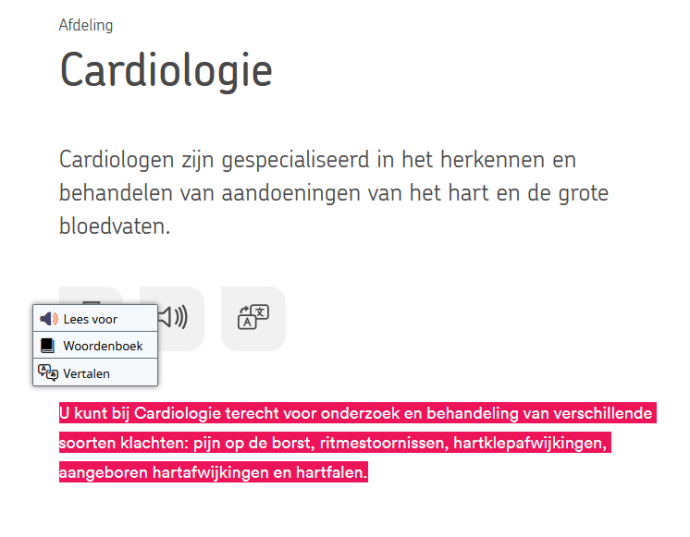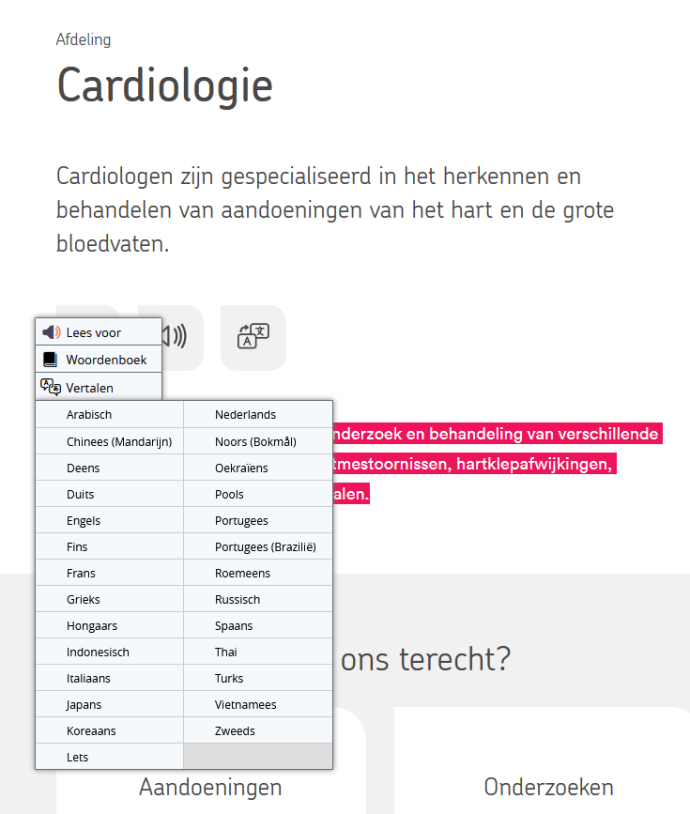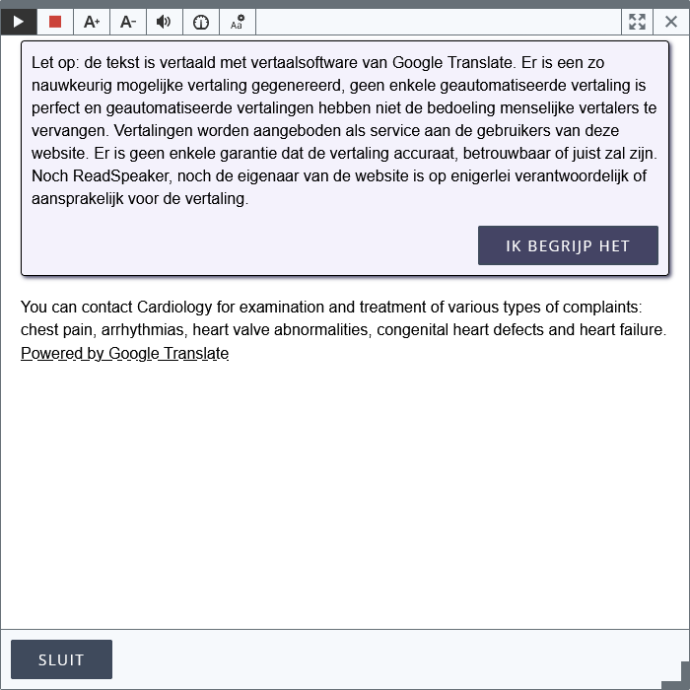Instructions after oral surgery (removal of a (wisdom) tooth, molar or root)
Laatste wijziging: 14-07-2025 Foldernummer: 1984
In this leaflet you can read more about the consequences after oral surgery. The following can occur:
- pain
- swelling
- limited mouth-opening
- painful sensation upon swallowing
- feeling generally unwell
- a temperature
These symptoms may take a week to subside.
Instructions
The local anesthetic will take 2 - 4 hours to wear off. If you experience pain, please use the advised analgesia. Do not take Aspirin (or acetyl-salicylates).
To minimize post-operative swelling, apply an icepack wrapped in a towel to the outer cheek/jaw upon your arrival at home. Keep it in place for 10 minutes and then remove it for 10 minutes before re-applying it. Repeat 4 times.
It is important to keep the operated area as clean as possible for the first few weeks after your surgery.
Practice normal oral hygiene but if you find it difficult to clean your teeth in the proximity of the wound because it is sore, you can keep the area free of bits of food by gently rinsing with a mouthwash after each meal. Alternatively, you can rinse your mouth with a solution of warm salt water. Simply dissolve a teaspoon of table salt in a cup of warm water and start using this on the day after your surgery.
Don’ts
- Do not rinse your mouth the first 24 hours after surgery.
- Do not drink alcohol because it will have a detrimental effect on wound healing.
- Do not smoke or chew tobacco because it will have a detrimental effect on wound healing.
Are there any risks?
Bleeding
Although you may have a little bleeding during the procedure, this usually stops very quickly and is unlikely to be a problem if the wound is stitched.
If the area bleeds again after you got home, applying pressure over the area for at least 10 minutes with a rolled-up handkerchief or gauze effectively stops the bleeding. If however, this is not the case, please contact us.
Nerves
There are two nerves that lie very close to the roots of your lower wisdom teeth. One of these nerves supplies feeling to your lower lip, chin and lower teeth. The other supplies feeling to your tongue and helps with taste. Sometimes these nerves may be ‘bruised’ when a wisdom tooth is taken out. This can cause a tingling or numbness in your lip, chin or tongue and, more rarely, altered taste. About one in
10 people will have some tingling or numbness that can last several weeks. Fewer than one in 100 will have problems that last more than a year. These risks may be higher if your tooth is in a difficult position. Your surgeon will tell you if you are considered to be at increased risk. If you find that your lip or tongue feels numb or tingles in the days following your extraction, please contact our receptionists on (070) 210 6710 to make an appointment at our department.
Infection
Although there is a small chance of infection, this is uncommon. Most often, this can easily be resolved, so when in doubt, contact us on the aforementioned telephone number.
Who can you contact with queries and concerns?
Please contact us when you experience one of the following situations:
- persistent bleeding
- temperature over 39 degrees centigrade
- difficulty swallowing
- progressive pain
- swelling after 5 days
Contact
Oral Surgery Consultant Clinic | Polikliniek Mondziekten, Kaak- en Aangezichtschirurgie HagaZiekenhuis Den Haag
- Els Borst-Eilersplein 275
- 2545 AA Den Haag
- Telephone number: (070) 210 6710
- Monday to Friday between 8.00 AM and 5.00 PM
Oral Surgery Consultant Clinic | Polikliniek Mondziekten, Kaak- en Aangezichtschirurgie HagaZiekenhuis Zoetermeer
- Toneellaan 1
- 2725 NA Zoetermeer
- Telephone number: (079) 346 4355
- Monday to Friday between 8.00 AM and 4.30 PM
Emergency Department | Spoedeisende Hulp Hagaziekenhuis Den Haag
- Els Borst-Eilersplein 275
- 2545 AA Den Haag
- Telephone number: (070) 210 0000
- Monday to Friday between 5.00 PM and 8.00 AM and saturdays, sundays and holidays
Wat vindt u van deze patiënteninformatie?
Wij horen graag uw mening over deze folder. Wilt u na het lezen enkele vragen beantwoorden? U vindt de vragen via deze link: https://folders.hagaziekenhuis.nl/2228. Dank u wel.
Spreekt u geen of slecht Nederlands?
De informatie in deze folder is belangrijk voor u. Als u moeite heeft met de Nederlandse taal, zorg dan dat u deze folder samen met iemand leest die de informatie voor u vertaalt of uitlegt.
Do you speak Dutch poorly or not at all?
This brochure contains information that is important for you. If you have difficulty understanding Dutch, please read this brochure with someone who can translate or explain the information to you.
Czy Państwa znajomość języka niderlandzkiego jest żadna lub słaba?
Informacje zawarte w tym folderze są ważne dla Państwa. Jeśli język niderlandzki sprawia Państwu trudność, postarajcie się przeczytać informacje zawarte w tym folderze z kimś, kto może Państwu je przetłumaczyć lub objaśnić.
Hollandaca dilini hiç konuşamıyor musunuz veya kötü mü konuşuyorsunuz?
Bu broşürdeki bilgi sizin için önemlidir. Hollandaca dilinde zorlanıyorsanız, bu broşürü, size tercüme edecek ya da açıklayacak biriyle birlikte okuyun.
إذا كنتم لا تتحدثون اللغة الهولندية أو تتحدثونها بشكل سيء إن المعلومات الموجودة في هذا المنشور مهمة بالنسبة لكم. إذا كانت لديكم صعوبة في اللغة الهولندية، فاحرصوا عندئذ على قراءة هذا المنشور مع شخص يترجم المعلومات أو يشرحها لكم.



